While Xbox’s successful new Direct format didn’t have a marquee game to show off like Starfield, the reveal of Hi-Fi Rush from Shinji Mikami’s Tango Gameworks was a wonderful surprise, only made better by the fact that it stealth-dropped on Xbox, PC, and Game Pass that very day. While the reveal trailer stood out thanks to its use of every single color in the Crayola box, it wasn’t till I got a chance to actually play the thing that I realized just how special it was. Hi-Fi Rush feels like a forgotten Dreamcast game in the best possible way, and it is the first great gaming surprise of 2023.
On paper, Hi-Fi Rush is a character action game where you play as Chai, a kid who gains the ability to feel the internal rhythm and pulse of the world around him, all while being able to use his rad new mechanical arm to magnetize bits of scrap metal into a battle ax guitar. The environment all moves to the beat of the soundtrack – pistons pump in a factory, crowds cheer at a concert, and even Chai himself taps his foot as an idle animation. When I mentioned the Dreamcast thing earlier, this is what I meant – the colorful take on this outlandish premise has big Jet Set Radio, Space Channel 5, and Crazy Taxi energy, as does its love and admiration for all things music.
The basic structure of the game is refreshingly simple – it doles out combat arenas, light exploration / platforming / puzzle-solving bits, and charming story bits in rapid succession. You’re graded after each encounter and can use the score you accumulate and bits you find while poking around the levels to upgrade Chai’s attacks, special moves, and stats back at your home base. Everything feels streamlined, and I love not being bogged down in the menu and customization hell that so many modern AAA games seem to revel in tossing us in.

That said, my one complaint at this early point in the game is that Chai’s basic movement speed feels a tad slow, especially when I’m exploring every nook and cranny looking for secrets. Maybe this quickens with upgrades over time, or maybe I’m unfairly comparing the game to Sunset Overdrive thanks to their shared attitude and color palette. But that’s just something that stood out to me.
While Hi-Fi Rush is definitely a part of the new wave of rhythm games where music isn’t just the genre, like Metal: Hellsinger, BPM, and Cadence of Hyrule, I find that this one is more forgiving than most of its contemporaries. While your attacks do help contribute elements to the music, it never felt like it was actively punishing me for being a bit off-key, but rather rewarding me when I was on the right beat. Its wide range of difficulty settings and swath of accessibility options give this one the malleability to cater to any kind of player, which I really appreciate. But when you’re locked into combat and dodging to the beat, the action and music curve together to create the kind of sensation found in Edgar Wright’s Baby Driver, which is amazing to experience.
While I saw some folks taken aback at Hi-Fi Rush being the new game from Shinji Mikami’s studio, considering it’s previously released the decidedly creepier Evil Within games and Ghostwire: Tokyo, Mikami’s roots aren’t just in survival horror. Yes, his thumbprint is all over Resident Evil 1 and 4, but he has just as much bombastic action in his DNA with games like P.N.03, Viewtiful Joe, Vanquish, God Hand, and the original Devil May Cry. Those first two are interesting as well, as they were part of the fabled “Capcom Five” for the GameCube, and if you told me that Hi-Fi Rush were actually a forgotten sixth member of that crew, I’d believe it.

And touching back again on the whole surprise reveal thing – in a world where we see games like Cyberpunk 2077, The Elder Scrolls VI, and Star Wars Eclipse revealed a full decade before their potential releases, Xbox’s strategy with Hi-Fi Rush is a breath of fresh air. It reminds me of what Nintendo did with Paper Mario: The Origami King back in 2020, when it revealed the game’s existence in May and released it a few weeks later in July. This truncated hype period cuts out the apathy we get from multiple promotional beats and suffocates any notion of cynicism that might spread on social media (looking at you, Forspoken). More of this, please.
I’m also a big fan of this new trend we’re seeing from Xbox in letting its big studios work on smaller passion projects in-between their massive AAA behemoths. We saw it last year with Obsidian’s Pentiment being released while Avowed is still in the works, and now Hi-Fi Rush comes on the heels of Ghostwire: Tokyo and whatever Tango’s next big game. I hope we see more of this from Xbox, and I’d even love for Sony to take some notes from it as well.
After two hours with the game, Hi-Fi Rush has immediately left a really great first impression. While some of this may be due to my own personal nostalgia and Xbox’s unique release structure, there’s such a strong sense of voice and style throughout every aspect of the game, right down to Chai’s clean character design that feels like Marty McFly crossed with Joe Musashi’s flowing scarf. By the time I got to the first boss fight, which was set to the beat of “1,000,000” by Nine Inch Nails, I was sold. I know we’re only a month into the new year, but I think we already have a contender for best surprise of 2023.






Published: Jan 26, 2023 03:00 pm